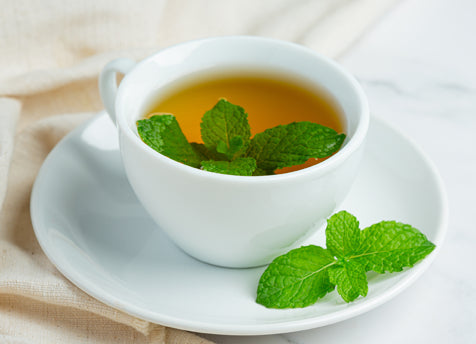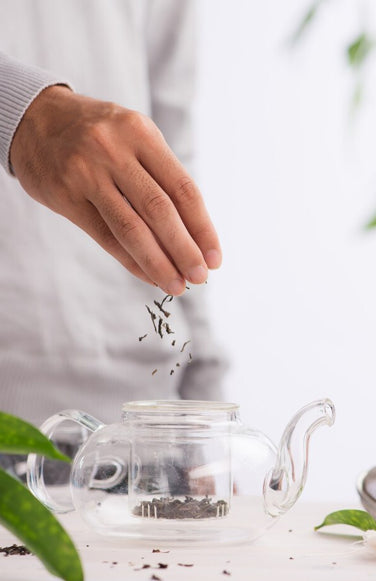Benefits of Tea
Tea is more than just a warm, comforting drink, it’s a centuries-old elixir brimming with powerful health benefits. From ancient herbal remedies to modern wellness routines, tea has stood the test of time as a natural way to nourish both body and mind. Whether you’re sipping green tea for its antioxidants, black tea for a gentle energy lift, or herbal blends to calm your nerves, each cup offers a unique blend of compounds that can support everything from metabolism and digestion to heart and brain health. Let's take a closer look at how tea can be a simple yet powerful addition to your daily wellness ritual.



Body Function & Metabolism Support
Metabolism
Tea, especially green tea, contains catechins (like EGCG) and caffeine, both of which are shown to mildly increase metabolic rate and enhance fat oxidation. While not a miracle fat-burner, regular consumption (3 - 4 cups daily) can help support weight management when combined with a healthy lifestyle.
Anti-inflammatory
Most teas, especially green, black, and herbal teas like turmeric or ginger, are rich in polyphenols and flavonoids, which help combat chronic inflammation. This can be beneficial in managing conditions like arthritis, autoimmune disorders, and even metabolic syndrome.
Gut-Health
Certain teas, such as green tea, peppermint, and chamomile, promote digestive health by supporting the growth of beneficial gut bacteria. The polyphenols in tea act as prebiotics, fostering the growth of good bacteria like Lactobacillus and Bifidobacterium.
Fertility
Tea may indirectly support fertility by reducing oxidative stress and improving overall hormonal balance. Spearmint tea, for example, has shown promise in balancing hormones in women with PCOS.

Mind & Mood Enhancers
Cognitive Function
Tea offers a combo of caffeine + L-theanine, which enhances focus, attention, and memory without the jitters of coffee. Long-term tea drinking is associated with a reduced risk of cognitive decline and may help delay the onset of Alzheimer's and Parkinson's disease.
Stress & Anxiety
Herbal teas like chamomile, lavender, ashwagandha, and lemon balm are known for their calming properties. Even regular green or black tea contains Mheanine, which helps promote relaxation and reduce stress without causing drowsiness. Tea rituals also provide a mindful, soothing routine.

Long-Term Health Protection
Insulin Sensitivity
Studies suggest that tea, especially green and black varieties, may improve insulin sensitivity and help regulate blood sugar levels. Catechins in tea are known to enhance glucose metabolism and may
reduce the risk of developing Type 2 diabetes when consumed regularly.
Cardiovascular Health
Tea is well known to support heart health. Green and black tea may help lower LDL (bad) cholesterol, improve blood vessel function, and reduce blood pressure. These effects contribute to a lower risk of stroke, heart attack, and other cardiovascular issues.
Cancer
While not a cure, antioxidants in tea (like EGCG and theaflavins) may/ reduce DNA damage and inhibit the growth of cancer cells. Green tea has been studied for its potential protective effects against
several cancers, including breast, prostate, and colorectal cancers. However, more human-based studies are needed for conclusive claims.
Bone Health
Emerging research shows that tea polyphenols may support bone mineral density by reducing oxidative stress and inflammation. Tea drinkers have been found to have better bone health, especially post-menopausal women, possibly lowering the risk of osteoporosis.

Beauty Benefits
Tea for Glowing Skin
Want healthier skin from the inside out? Tea can help! The antioxidants in green tea and herbal infusions work to combat free radicals, reduce inflammation, and slow visible signs of aging. Green tea, in particular, has shown promise in soothing acne-prone or irritated skin. PIUS, staying hydrated with tea keeps your skin looking plump and refreshed. Ifs not a miracle cure, but it's a gentle, supportive step toward your skincare goals.
Hair Goals
Some teas do double duty, not just as a drink but as a beauty' boost for your hair. Green tea's antioxidant content may promote hair growth and help reduce hair fall, while herbal teas like hibiscus or nettle nourish the scalp and improve shine. Some people even Use tea rinses to soothe dandruff or bring out natural highlights. Results can vary, but when combined with a proper hair care routine, tea can be a great natural ally.
























